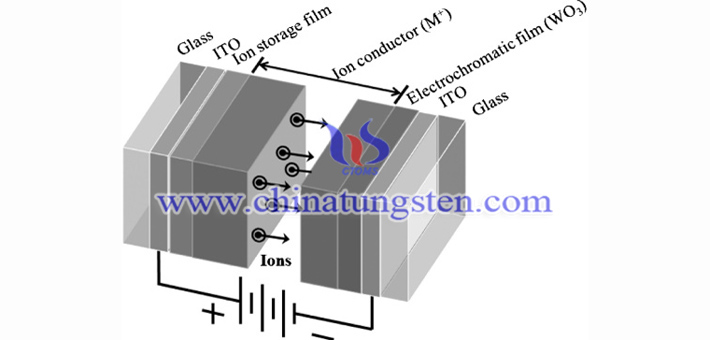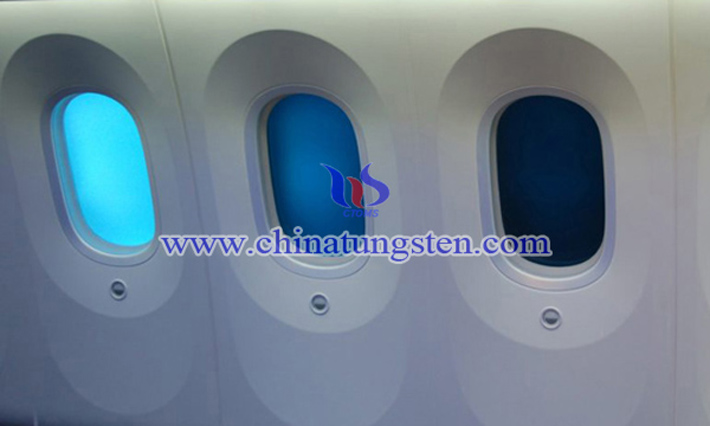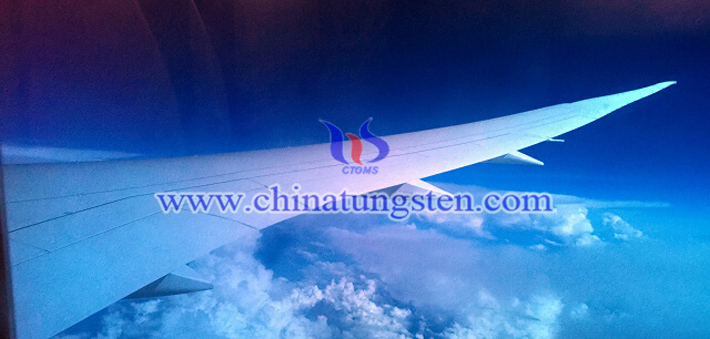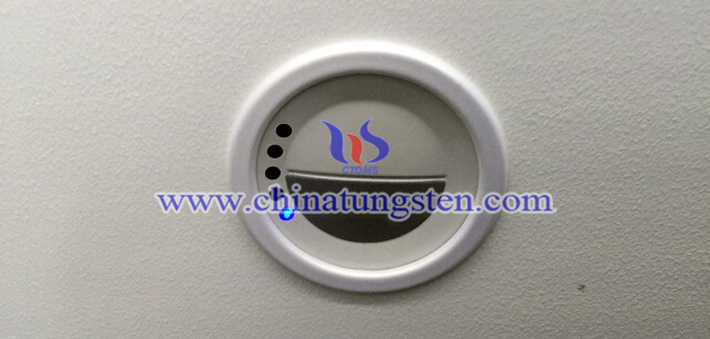Tungsten Oxide Electrochromic Film Has The Same Effect As The Boeing 787 "Dream Window"
- Details
- Category: Tungsten Information
- Published on Thursday, 24 January 2019 09:29
The Boeing 787 "dream window" does not have a visor, but it can change the transparency, and the effect of this is the same - tungsten oxide electrochromic film.
The porthole of the Boeing 787 has no visor, but it can change the transparency! You only need to press the button; the porthole will become a "chameleon" until it is completely darkened! Of course, the captain can also dim directly from the cockpit when the night falls. In addition, because the color change process of this "electronic curtain" is gradual, you don't have to worry about the eyes being uncomfortable. What's more, when an unexpected power outage occurs, the portholes become completely transparent and comply with relevant aviation standards. At this point, some readers may ask, "So, can you easily put the Boeing 787 'magic window' home?" This just seems impossible. In fact, only need - the tungsten oxide electrochromic film black technology can give you Boeing 787 enjoy.

Electrochromism refers to a phenomenon in which the optical properties (reflectance, transmittance, absorptivity, etc.) of a material undergo a stable and reversible color change under the action of an applied electric field, and the appearance is a reversible change in color and transparency. So what is the principle of electrochromism? The principle of electrochromism is the use of electrical energy to change the color of a conductive medium sandwiched between two layers of glass, such as a thin film or a thin layer of gel. Current flows through the transparent conductive layer on the inside of the outer glass, causing a chemical reaction of the electrochromic medium, causing a change in the transparency of the medium. The principle of discoloration specific to the tungsten oxide electrochromic film is that the tungsten oxide electrochromic glazing uses a tungsten trioxide film as a medium, and a small voltage is applied to the film to darken it, and the film is recovered after the power is turned off. To the natural state of transparency. This process voltage can be precisely controlled, and by adjusting the amplitude to increase or decrease the voltage, the required transmittance can be obtained.

In fact, this kind of glass can be said to be a kind of smart glass. Under the action of electric field, it has the adjustability of light absorption and transmission, and can selectively absorb or reflect the external heat radiation and the internal heat diffusion, thereby reducing civilian use. Residential and office buildings are “cool” in the summer and “warm” in winter and consume a lot of energy. In short, they are four words – energy saving and emission reduction. At the same time, this smart glass also aims to improve the natural light level and prevent peek.

Furthermore, tungsten oxide has electrochromic properties, that is, it is an electrochromic material. Devices made of electrochromic materials are referred to as electrochromic devices. So, what are the applications of tungsten oxide thin film electrochromic devices? Electrochromic devices that have been industrialized currently include displays, automotive automatic anti-glare rearview mirrors, and the like. Electrochromic materials have bitable properties, so electrochromic displays made of electrochromic materials not only do not require a backlight, but also display static images, as long as the display content does not change, no power is consumed. The purpose of energy saving. For automotive automatic anti-glare rearview mirrors, current automotive rearview mirrors use liquid crystal materials, which can only be switched between light and dark, giving the human eye an uncomfortable feeling, especially when the summer sun is strong. The sun will stab people's eyes and easily lead to traffic accidents. However, the use of an automotive rearview mirror with electrochromic properties can automatically adjust its reflectivity continuously according to external conditions, making the human eye feel comfortable.

Finally, let's take a look at the material requirements for tungsten oxide thin film electrochromic glass. In practical applications, especially in the preparation of electrochromic devices, electrochromic materials generally meet the following requirements: good electrochemical redox reversibility; fast color change response; reversible color change; highly sensitive color change; has a high cycle life; has a certain storage memory function; stable chemical properties.

Electrochromic materials are used in a wide range of applications in information, electronics, energy, construction, and defense. As one of the most promising smart materials at present, electrochromic materials have been extensively studied. Among them, inorganic metal oxides are the most studied, especially WO3. Nowadays, many devices made of WO3 electrochromic materials have been put on the market. In the future, driven by the implementation of the national environmental protection policy and the urgent need for energy conservation and emission reduction, the “dream window” with the Boeing 787 will be easy to install.
- Tungsten Oxide Manufacturer & Supplier, Chinatungsten Online: www.tungsten-oxide.com
- Tungsten News & Prices of China Tungsten Industry Association: www.ctia.com.cn
- Molybdenum News & Price: news.molybdenum.com.cn
- Tel.: 86 592 5129696; Fax: 86 592 5129797; Email: sales@chinatungsten.com



 sales@chinatungsten.com
sales@chinatungsten.com